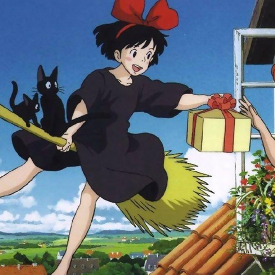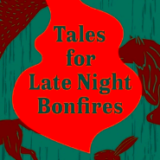
OBIR: Occasional Biased and Ignorant Reviews reflecting this reader’s opinion.

AUGUR MAGAZINE #4 V2.1 – May 2019
Published out of Toronto, Ontario, Canada.
Publisher and Editor-in-Chief: Kerrie Seljak-Byrne. Managing Editor: Alexander De Pompa. Senior Editor: Mado Christie. Poetry Editor: Terese Mason Pierre. Graphic Fiction Editor: Amy Wang. Assistant Editors: Victoria Liao, Vivian Li, and Lawrence Stewen.
Cover: by Janice Lui
Purpose, intent and function of zine as described on their web site:
“We are excited by writing that is difficult to classify—whether specifically speculative, substantially surreal, or slightly strange. We’re interested in realist pieces that verge on the dreamlike or surreal; speculative stories that are almost realist; and, on top of that, any form of literary fantasy/science fiction/speculative fiction. Augur makes room for writing from uncommon perspectives, and brings together the often disparate realms of literary and genre fiction.
Our goal is to publish at least 75% Canadian and Indigenous content … and we’re committed to featuring intersectional narratives as represented by characters, storytelling, and, in particular, author representation.”
Editorial: And When Change Comes – by Kerrie Seljak-Byrne
Review:
Kerrie points out that Augur offers no theme during submission periods (next open window will be October 2019, by the way) but that everything accepted for this issue has to do with change and how people respond to change. Dare they take charge? Is it a source of power? Or something beyond control? This is no mere abstraction. It is one of the fundamental questions we face in our lives, sometimes annoyingly often. In my case I usually ignore change and live in the past. Makes for a firm anchor for my version of reality, I find.
However, Kerrie is happy to embrace change to that extant that Augur has improved and matured since it began last year. Good to hear! Canadian writers need flourishing markets.
Let’s contrast payment schemes with my magazine Polar Borealis:
I pay $10 a poem. Augur pays $40.
I pay $10 for stories 1,000 words or less. Augur pays $60.
I pay $0.01 a word for longer stories. Augur pays $0.06.
Methinks if you are a Canadian author (who meets their guidelines) with a poem or short story to sell, you should try Augur first. Makes sense to me.
The One Before Scheherazade – by Bianca Sayan
Premise:
Scheherazade is probably one of the most famous female characters of all time. Her tale begins when the Sasanian King Shahryar kills his wife for taking a lover. He then comes up with an unusual method for keeping his spouse faithful, which is to marry a virgin every day and then execute her the next day just before taking vows to another bride. This ensures none of his wives live long enough to betray him. He marries and poisons 1,001 virgins, then selects Scheherazade, his Vizier’s daughter, who is extremely well read and quite the story-teller. The first night she tells a whopping great yarn but doesn’t reveal the ending. Shahryar grants her one more night of life to complete the tale, which she does, but begins another right away without finishing, so she gets to live yet another night, and so on. Clever girl, relying on all the myths and fables she’d read to enthrall the King who, it seems, had never read a book in his life. Eventually, of course, she’d run out of stories, but amazingly enough, by sheer coincidence, after listening to her tell 1,001 tales he’s fallen in love with her and they live happily ever after. Somehow. Maybe she ordered more books and kept up the stories, or they developed a new shared hobby, breeding peacocks perhaps, I can’t remember.
This story isn’t about Scheherazade. As the title says, it’s about “The One Before Scheherazade.” Think about it. The 1,001 virgins get short shrift in “A Thousand and One Nights.” The focus is on Scheherazade and Shahryar. What was it like for the girls who were dragged off to the palace and certain death before her? Bianca writes to illustrate their point of view.
This is the tale of the last girl before Scheherazade. The Vizier, charged with finding the virgins, is reduced to scraping the bottom of the barrel which is why all he can find is a dirty, illiterate, totally uncultured twelve-year-old girl from a poverty-ridden village. She is flung into a beautifully appointed apartment to be bathed and fed prior to her wedding. She can do nothing but await her fate.
Review:
The girl, who like the King is not named, may be uneducated, but she’s not stupid. She knows exactly what is going on and envies her sister who had managed to kill herself by jumping into a fast flowing river when the palace guards came. Since escape appears impossible, the only tension in the story depends on whether the girl can emulate her sister or, through lack of opportunity, become resigned to her fate. Consequently, with so little time available, she becomes hyper-observational, notes every facet of her situation, attempts to interrogate the servants, and seeks to discover whatever possibilities exist to thwart or, at least, defy the King’s intentions. This motivation justifies the amount of description in the story, renders it thoroughly credible. A very useful writing technique, methinks.
Every bit of description is meaningful to the character, is something she can relate to, or reveals something about her past, or about her ability to find meaning in the smallest details. Everything reflects her questing, querying state of mind, often in a striking manner. For instance, I was quite taken with her observation, gazing down at a rose garden from the fourth floor balcony of her prison, that this was the first time in her short life she had ever been in a building higher than the one-storey mud hut she grew up in. A brand new perspective, alien and beautiful, yet rendered irrelevant in light of her predicament, unless, that is, if it offers a solution? If only she can find the courage?
Some readers might consider the girl’s calm, rational approach to her situation inexplicable. Shouldn’t she be hysterical with panic? Helpless with fear? But she’s been extremely poor all her life and therefore accustomed to deciding realistically what can or cannot be done to ensure survival. Poverty demands a practical frame of mind. Denial or despair equals death. This is the quiet drama of the real world and it is faithfully reflected in the thinking of this character. For that reason alone, this is an exceptionally good story.
Sheherazade is the “star character” who solved the problem and gets all the fame, but the 1,001 girls before her, fictional though they may be, represent untold millions of girls and women who attempt to fulfill their destiny before fate catches up with them first. This story speaks for them all.
Howl (Poem) – by Cat Friesen
Premise:
Too short to describe.
Review:
It is a found poem based on a short story I have not read. The title puts me in mind of the poem that shot Allen Ginsberg to fame, but there’s no connection between the two poems that I can see except, perhaps, an element of anguished protest. But the “Howl” is all in the title. The poem itself, despite some striking imagery, is a rather calm, soothing expression of how some cope with inevitable change. Hopeful in fact. A beautiful poem.
Brown Bird, Whitish Bone (Poem) – by Frances Boyle
Premise:
Too short to describe.
Review:
Another found poem, I guess, in that’s based on a scene in Ursula K. Le Guin’s novel Always Coming Home. Proof that time travelers are interested in everything, even the inconsequential. The subject is the kind of thing that would draw your attention if you were standing there, but probably only for a second or two. The prolonged focus seems a bit morbid. However, the observer is something of a professional observer so it makes sense. I haven’t read the book. For all I know what is being seen is of great significance. As an isolated description the poem vividly places the reader on the spot and offers a brief sense of being there. The kind of thing that could easily become a false memory purporting to be an actual experience.
I was quite pleased by one particularly deft piece of description that struck me as highly original, but the poem is only 28 lines long and, since I don’t want to diminish its initial impact on the reader, choose not to quote it. Have fun guessing which line I am referring to.
Clear as Quartz, Sharp as Flint – by Maria Haskins
Premise:
Jenna is pregnant. The ancient ring of sarsens atop the tor have begun to sing to her. She can’t make out the words, but the melody grows stronger and clearer in her mind. Eventually, she can no longer resist the lure of the singing stones and climbs the tor in the middle of the night to commune with them.
Review:
The pagan sensibilities combined with a lack of situational description place the story in a rather timeless period before the coming of the Romans but long after the stone circle was first erected. The intricacies of its purpose and function seem largely forgotten. It is now a place of ill omen inimical to mother and child. People put their faith in wooden household idols instead. And yet … and yet … the power of the old ones is as strong as ever.
I don’t know if this story is based on New Age Pagan beliefs or not. The basic gist of the story doesn’t tie in with what I know of the religious practices of my ancestors, but it “feels” right. At first the story trends toward a resolution that would make sense to anyone who is purely the product of modern western civilization, but then veers toward an ending that would undoubtedly strike them as superstitious nonsense. However, to those with some understanding of pre-Christian European spirituality, the conclusion of the story is appropriate and “natural.”
That said, I don’t want to imply the ending was predictable. It took me by surprise. Yet fits perfectly within the premise of the story.
Often, fiction (and TV and film) portrays pagan spirituality, philosophy, life-style and customs from an anti-pagan Christian viewpoint, however subtly or overtly, that misrepresents what people actually felt and believed back in the day. What I like about this story is that, whether it reflects a genuine folk belief or is the product of the author’s imagination, it conveys a powerful sense of what pagan faith was really all about.
Besides, it is fundamentally a sad yet hopeful story about a mother’s love. What’s not to like?
Advice From Granny Moon (Poem) – by Erin Emily Ann Vance
Premise:
Very short, and as the title indicates, personifies the full Moon as a granny.
Review:
I don’t expect old grannies to dispense advice advocating extreme violence. Not my usual vision of the full Moon. The imagery is vivid all right. Quite disturbing. Expressed in original descriptive terms I don’t believe I’ve ever seen before. I refuse to speculate on what the poem means. It upsets me enough as it is. To sum up: powerful. Maybe too powerful.
Exquisite Divorce (Graphic Art) – by Isabelle Nguyen
Premise:
In Vietnam Dr. Cuoi finds his perfect woman. Unfortunately she is dead. So, he brings her back to life. They get married. Then he leaves her. Thirty years later he sues for divorce. How does she respond?
Review:
Five pages and only 7 panels in length, this graphic art piece says everything it needs to say with exquisite economy. Featuring both science fiction and fantasy elements, it ends with a thoroughly satisfying resolution. Call it a visual poem. I think it is remarkably good. I’m impressed.
Fish Mouth (Poem) – by Quarat Dar
Premise:
Ah, yes. Fish. I’ll just say that there are a lot of fish in this poem, acquired in an unusual way after Grandmother died.
Review:
I’m stumped. It boils down to what the fish represent. Life? Sperm? Rebirth? Materialism gone wild? Salvation? The list of possibilities seems endless. I really hate being too clueless to figure out the hidden meaning of surreal imagery.
I’m reminded of the time I saw a student film consisting entirely of raw eggs being cracked open inches above the body of a naked woman. The rest of the audience applauded. I sat there dumbfounded. The raw eggs flowing around her curves represented what? Fertility? Motherhood? Creation? Femininity? The Earth Goddess? The ultimate chicken? I had no idea.
Fish Mouth is not meant to be a whimsical poem. It contains elements of grief, of loss, and of failure. But what the heck do the fish represent? Expressions of guilt? Or a coping mechanism offering hope? I experienced the loss of my grandparents fifty years ago and I still don’t understand this poem. I think it has an optimistic ending but I’m not sure.
It may be I am overthinking the surreal imagery. Probably it means whatever it means to the reader, every reader interpreting it differently. I’m fine with that. I just can’t come up with an interpretation of my own, that’s all.
That Final Corner – by Marcus Creaghan
Premise:
Children begin disappearing in a nameless port-city of stone buildings, holy water, whale oil lamp streetlights and wooden ships bringing goods such as “highly-addictive” coffee. At first the existence of a secret of society of child-murderers is suspected, but there is no evidence. Then it turns out the children are literally running away, but how and why cannot be determined.
Review:
The story skirts perilously close to withholding needful information till it becomes convenient to the plot in that the children are making use of an aspect of the city that is known to the adults. However, it turns out the children know more about the city than the adults, and are fleeing something the adults know nothing about. Fact is the entire population is united in its helpless state before a third party or force not specified but infinitely more powerful.
I think this is a metaphor for the forever battle between generations where the younger generation constantly attempts to escape from the consequences of the mistakes of the older generation so the younger generation will be free to make mistakes of its own. This be my best guess as to what it is really all about.
I mentioned earlier in this column how I appreciate pagan lore taken at face value, even to the extent of supernatural entities described as part of the real world for the sake of fiction, but my level of interest drops away when a more generic form of magic is employed. I like a good Balrog, so to speak, but the shaking of wands leaves me unmoved. The resolution of this story employs a mysterious form of magic that is a tad too mysterious for my taste.
Also, there are no characters in this story. No individuals. It speaks of parents and children. There’s really no one to identify with. The one attraction is the mystery of the disappearing children. The resolution to this conundrum is okay but raises more questions than it answers, which is why I think it would make an intriguing opening chapter in a fantasy novel about malcontents striving to save the world from a great and terrible threat. For this you need characters with names like Thorthrup the Craven or Megabaloo the Indolent. Somebody out of the ordinary the reader can identify with!
As it stands the story is a metaphor wrapped in a fable. Not quite my cup of tea.
Poem in Which I Transition into a False Moon (Poem) – by Aeon Ginsberg
Premise:
A Bi-Trans struggles against the universal tendency to define an individual by one gender only.
Review:
The imagery has a Greco/Roman classical feel which lends a stately dignity to the bald statement that no matter what you happen to be others will consider you fake. The ending, blandly factual but powerfully expressed, approaches Greek tragedy. Some poems just slide by. This one, offering no solutions and simply laying out the way things are, kicks the reader in the gut. Impressive.
Control, Alt, Delete (Poem) – by S. Matthiesen Aviles
Premise:
Dealing with those who seek control.
Review:
At first I thought this was a feminist statement offering a curious, tradition-affirming solution, but then it expanded to include all victims. The strident ending left me befuddled. The title a new motto for our times, I guess.
Roots and Shoots – by Laura DeHaan
Premise:
Somewhere in Canada a robot toils. It is a welding robot, weighs a ton, and has four limbs ending in machine tools. Unfortunately, it is powered by magic which renders it useless for the job it was originally designed for. On the other hand, it earns a good living utilizing dried beans to construct magic charms for its neighbours. It makes a charm for its good friend taneisha, a teenage girl who wants to remember everything. She’s very excited. Her mother darlene is going to tell her all about her dad. What she hears she doesn’t want to hear, or remember, and to make things worse, she keeps cutting her fingers on the sharp edges of the charm.
Review:
Maybe I’m not well-read, but a robot powered by magic is a new concept to me, an original concept I find quite charming. (Yes, I know, I’m not fond of magic, but this is something beyond generic magic.) I also like the matter-of-fact way the robot views magic as a simple, obvious mechanism for earning a living. It works, therefore it doesn’t need to be explained.
But the real charm of the story is that it is told from the robot’s point of view. This is a feat normally quite difficult to pull off, but Laura makes it seem easy. Logical? Of course. Indeed the robot is constantly repeating to itself “this does not seem like a concept too difficult to understand” when attempting to analyse why humans keep misunderstanding the meaning of what it is attempting to convey.
The robot is, of course, programmed, but this does not prevent it from being adaptable to changing circumstances or adopting extraordinarily complex patterns of thought. Humans, in contrast, appear to be victims of their programming and even more predictable than robots, as if afflicted with an inferior processor easily overwhelmed by input beyond its capacity to properly process. I have the impression that this robot, if asked what is wrong with people, would simply reply “Humans think too much.”
Granted, a story that asks the question “Of the two, robot and girl, which is the real robot?” may not seem all that original, but the delightful contrast between two equally valid mental perspectives, enlivened with considerable touches of dry wit, and somehow convincing despite the impossible premise, is refreshingly entertaining and well worth reading.
For a guy who hates “magic,” I like this story a lot.
CONCLUSION:
The quality of fiction and poetry in this magazine is quite outstanding, and I certainly want to see it continue. It is apparently dependent on an Ontario Arts Council Grant for funding. The Conservative Government of Premier Ford just cut the Ontario Arts Council budget by five million dollars, with particular emphasis on cutting programs to do with indigenous culture, and more cuts are “promised.” This does not bode well for the fate of this magazine. Not too long ago Canada Council cancelled its annual grant to On Spec Magazine, yet that zine has managed to survive. Fingers crossed for the future of Augur Magazine.
You can find Augur at: Augur Magazine










